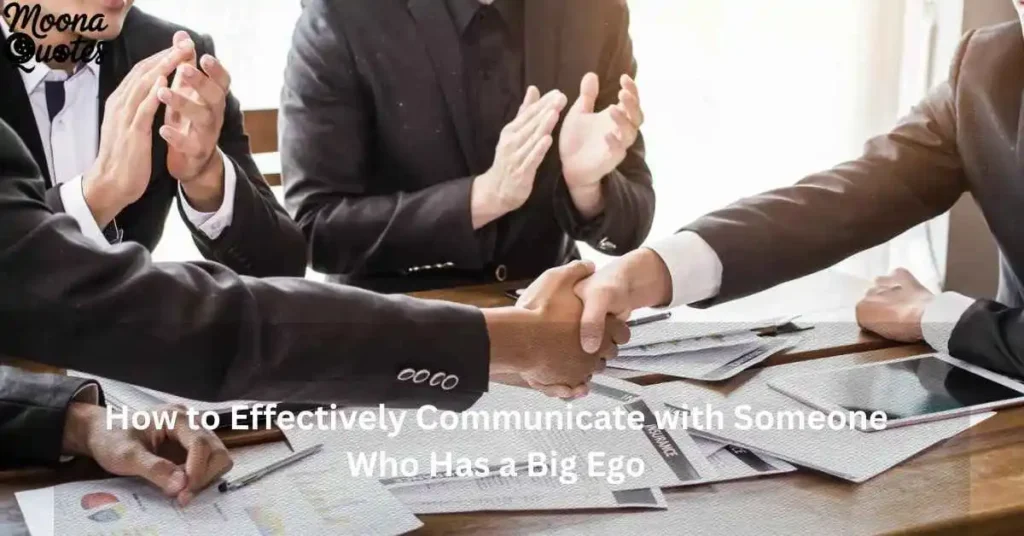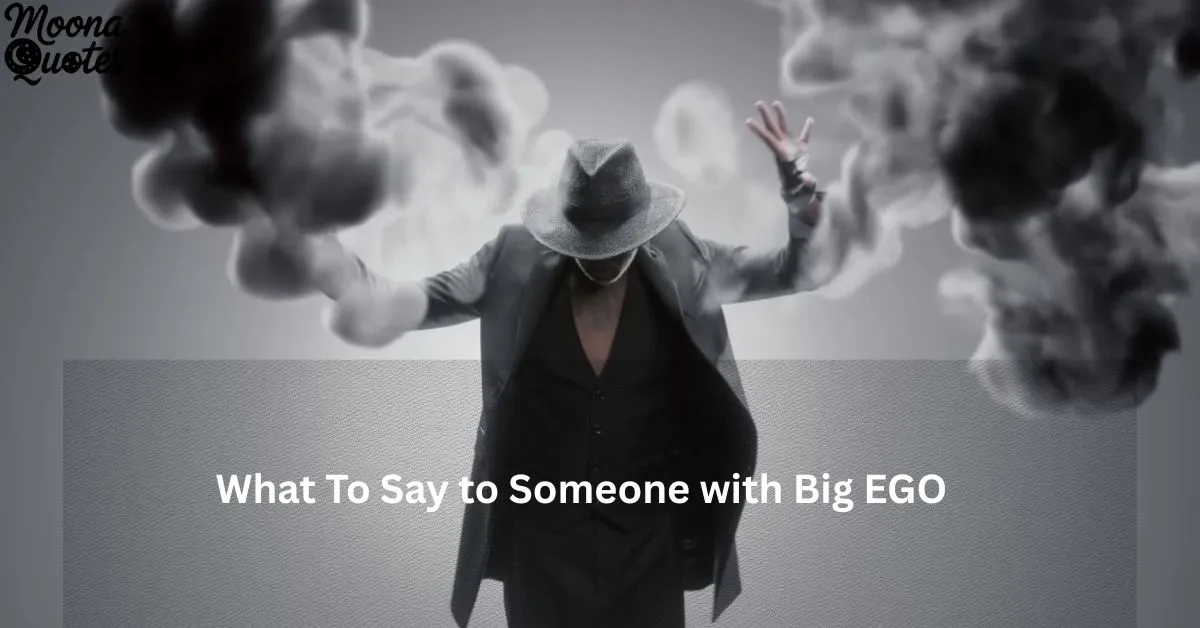Dealing with someone with a big ego can be tricky. They often seek attention and validation. If you say the wrong thing, they may get defensive. But with the right words, you can keep the conversation smooth.
The key is to be calm and strategic. You don’t want to feed their ego too much. At the same time, you don’t want to trigger their pride. In this guide, you’ll find 99 examples of what to say. These will help you handle them with confidence.
In Case You Wonder What to Say to Hurt or Hit Someone’s Ego
If you want to hit someone’s ego, it’s about targeting their insecurities and challenging their inflated self-image. Phrases like “Your arrogance doesn’t impress anyone” or “Respect isn’t demanded; it’s earned” can make them question their behavior. But remember, hurting someone’s ego rarely leads to meaningful change.
- “Your arrogance doesn’t impress anyone, it only isolates you more.”
- “Maybe listen more and talk less; wisdom comes from learning.”
- “Not everyone admires your confidence; some just tolerate it.”
- “You always need validation; that’s a sign of deep insecurity.”
- “You think you’re special, but everyone is replaceable, even you.”
- “Respect isn’t demanded, it’s earned; stop expecting automatic praise.”
- “Your success doesn’t define you; your character does instead.”
- “You ignore advice but expect admiration; that’s not how it works.”
- “Confidence is great, but arrogance pushes people away from you.”
- “You’re not the smartest in the room, just the loudest.”
- “Everyone sees through your act; humility would serve you better.”
- “You crave attention so much that it becomes embarrassing.”
- “Stop acting like you’re flawless; everyone has weaknesses too.”
- “You love compliments but can’t handle even slight criticism.”
- “Arrogance hides fear; maybe it’s time to face your own.”
- “Your words lack meaning when spoken only to impress others.”
- “Being admired isn’t the same as being genuinely respected.”
- “Not everyone is competing with you; some just don’t care.”
- “You put yourself first but expect others to stay loyal.”
- “A big ego is a small mind trying to seem important.”
- “Bragging about yourself won’t make people admire you more.”
- “People agree with you just to avoid pointless, exhausting arguments.”
- “You mistake fear for respect, but they’re not the same.”
- “The louder you brag, the more people secretly roll their eyes.”
- “Confidence is silent, but insecurity always needs to be loud.”
- “You act invincible, but everyone sees the cracks underneath.”
- “Your need for constant praise makes you seem very fragile.”
- “A real leader lifts others; you only try lifting yourself.”
- “You think you’re a genius, but wisdom requires self-awareness first.”
- “Your ego makes you blind to your own repeated mistakes.”
- “You believe you’re admired, but people actually just tolerate you.”
- “Stop acting like the world owes you endless admiration.”
- “Every conversation with you turns into an exhausting competition.”
- “If you’re always the smartest person, you’re in trouble.”
- “You demand loyalty but never show it in return.”
- “You use confidence as a mask to hide deep fears.”
- “You need to win every argument, which makes real discussion impossible.”
- “A real winner doesn’t need to constantly remind everyone.”
- “You think people envy you, but they mostly feel annoyed.”
- “Success is great, but kindness is what truly earns respect
Understand the Big Ego and Signs
Understanding a big ego means recognizing traits like constant bragging, defensiveness against criticism, and a need for validation.
They may dominate conversations, exaggerate achievements, and struggle with empathy. Often, insecurity hides beneath arrogance. Recognizing these signs helps you handle their behavior without getting frustrated or undermined.
- “They always seek praise, even for the smallest achievements.”
- “They dominate conversations and rarely listen to other people.”
- “They interrupt often, believing their thoughts are more important.”
- “Criticism makes them defensive, even when it’s constructive advice.”
- “They overestimate their abilities and refuse to admit mistakes.”
- “They constantly compare themselves to others to feel superior.”
- “They exaggerate achievements to make themselves seem more important.”
- “They expect special treatment and get upset when denied.”
- “They surround themselves with people who constantly praise them.”
- “They take credit for success but blame others for failures.”
- “They struggle with empathy and dismiss other people’s feelings.”
- “They can’t handle losing and always find excuses.”
- “They brag about their intelligence, wealth, or social status.”
- “They act superior, looking down on those they consider ‘lesser.’”
- “They manipulate others to get validation and admiration.”
- “They hold grudges when they feel their ego is hurt.”
- “They refuse to acknowledge when they’re wrong or mistaken.”
- “They dominate group settings and expect attention from them.”
- “They rarely apologize and see apologies as a weakness.”
- “They are highly competitive, even in unimportant situations.”
- “They talk about themselves more than they ask questions.”
- “They see others as stepping stones to personal success.”
- “They reject feedback unless it’s praise or admiration.”
- “They exaggerate their struggles to appear strong and heroic.”
- “They feel threatened by others’ success and downplay achievements.”
- “They pretend to be humble but crave attention constantly.”
- “They often make sarcastic or condescending remarks about others.”
- “They pretend to know everything, even when they clearly don’t.”
- “They fish for compliments by acting insecure or doubtful.”
- “They use charm to manipulate and get what they want.”
- “They avoid deep connections since vulnerability threatens their ego.”
- “They demand loyalty but rarely give it in return.”
- “They believe rules don’t apply to them like everyone else.”
- “They downplay others’ achievements while exaggerating their own.”
- “They get jealous when someone else gets more attention.”
- “They act like experts in fields they barely understand.”
- “They make everything about them, even unrelated conversations.”
- “They refuse to accept help, fearing it shows weakness.”
- “They assume they’re more important than they are.”
- “They see admitting faults as a threat to their pride.”
Related Blog: What To Tell and Ask Your Idol When You Meet Them: 113 Examples
How to Effectively Communicate with Someone Who Has a Big Ego

Communicating with someone who has a big ego requires patience, tact, and strategy. Stay calm and avoid reacting emotionally to their arrogance.
Use facts over opinions, maintain a neutral tone, and set boundaries. Compliment subtly before offering criticism, and ask thoughtful questions to guide them without triggering defensiveness.
- “Stay calm and don’t react emotionally to their arrogance.”
- “Use facts instead of opinions to avoid unnecessary arguments.”
- “Let them talk first; they love to hear themselves.”
- “Give small compliments before offering constructive criticism or advice.”
- “Avoid direct challenges that may make them feel threatened.”
- “Use indirect suggestions instead of blunt corrections to guide them.”
- “Keep your tone neutral, avoiding sarcasm or obvious frustration.”
- “Set clear boundaries without engaging in their power games.”
- “Stay confident but not confrontational to maintain your authority.”
- “Acknowledge their achievements, but don’t over inflate their ego.”
- “Redirect conversations when they start boasting excessively.”
- “Use ‘I’ statements to express opinions without making accusations.”
- “Give them choices to make them feel in control.”
- “Ask strategic questions to make them think critically.”
- “Don’t let their arrogance make you doubt your self-worth.”
- “Remain patient, but don’t tolerate blatant disrespect.”
- “Don’t waste energy proving yourself to someone self-absorbed.”
- “Show confidence without trying to outshine or compete.”
- “Speak in a way that appeals to their self-interest.”
- “Avoid feeding their need for excessive validation or praise.”
- “Stay professional in work settings, even if they provoke.”
- “Maintain emotional distance to avoid being manipulated.”
- “Recognize when they’re gaslighting or twisting the truth.”
- “Don’t try to fix them; some people never change.”
- “Use humor strategically to defuse tension in conversations.”
- “Be direct but tactful when addressing important issues.”
- “Lower expectations, so their behavior doesn’t constantly frustrate you.”
- “Speak concisely; they lose interest in others’ long explanations.”
- “Avoid expecting deep empathy or emotional understanding from them.”
- “Encourage teamwork so they feel valued without dominating.”
- “Limit personal sharing; they may use information against you.”
- “Let them take credit sometimes if it avoids conflict.”
- “Be firm when they try to manipulate or guilt-trip.”
- “Use positive reinforcement when they act less egotistical.”
- “Recognize when to disengage from exhausting discussions.”
- “Refuse to play into their superiority complex.”
- “Don’t argue when they crave attention; silence is powerful.”
- “Know when to walk away if they become toxic.”
- “Remain diplomatic without being overly submissive or passive.”
- “Respect yourself enough to not let their ego control you.”
When to Walk Away
Knowing when to walk away from someone with a big ego is essential for your well-being. If conversations always turn into competitions, they never apologize, dismiss your feelings, or manipulate you for validation, it’s time to leave. Protect your peace and prioritize relationships that offer mutual respect and kindness.
- “When every conversation turns into them bragging about achievements.”
- “When they belittle you to make themselves feel superior.”
- “When they ignore your feelings and only focus on themselves.”
- “When they twist your words to always make you wrong.”
- “When they refuse to listen but expect you to obey.”
- “When they get defensive over minor feedback or criticism.”
- “When they manipulate you to gain attention or control.”
- “When they demand constant admiration without reciprocating respect.”
- “When they exaggerate stories to seem more impressive.”
- “When they refuse to take responsibility for their mistakes.”
- “When they act entitled and expect special treatment always.”
- “When they never apologize but expect you to forgive.”
- “When they drain your energy with their constant arrogance.”
- “When they make you feel small just to feel bigger.”
- “When they refuse to respect your boundaries or needs.”
- “When they manipulate you with guilt whenever you disagree.”
- “When they turn everything into a competition against you.”
- “When they show no genuine care for your well-being.”
- “When they only talk about themselves and never ask questions.”
- “When they react angrily if you don’t praise them enough.”
- “When they treat friendships as tools for their personal gain.”
- “When they gaslight you into thinking you’re always wrong.”
- “When they expect you to admire them no matter what.”
- “When they don’t appreciate you but expect constant loyalty.”
- “When they always dismiss your opinions as unimportant.”
- “When they get jealous if you receive any attention.”
- “When they refuse to compromise or admit when they’re wrong.”
- “When they view kindness as weakness and exploit good people.”
- “When they lack empathy and can’t connect emotionally.”
- “When they downplay your success while exaggerating their own.”
- “When they control conversations to avoid talking about real issues.”
- “When they ignore your needs but expect their needs to be prioritized.”
- “When they make you feel exhausted after every interaction.”
- “When they never celebrate your wins but expect you to celebrate theirs.”
- “When they make promises they never intend to keep.”
- “When they see relationships as opportunities rather than real connections.”
- “When they never grow or improve but demand respect.”
- “When they act fake humble but crave constant validation.”
- “When they use intimidation to make themselves feel important.”
- “When they refuse to change, despite how it affects others.”
Key Takeaways: Dealing with Someone with a Big Ego
Dealing with someone with a big ego requires patience, strategy, and emotional control. Stay calm, use facts over opinions, and avoid direct challenges.
Set boundaries and remain confident without feeding their ego. Remember, you can’t change them, but you can control how you respond and protect your well-being.
- “Big egos crave attention, validation, and constant admiration.”
- “They often exaggerate achievements to appear more impressive.”
- “They struggle with criticism and react defensively when challenged.”
- “Their arrogance hides deep insecurity and fear of failure.”
- “They dominate conversations and rarely listen to other perspectives.”
- “They expect special treatment but rarely show gratitude.”
- “They manipulate situations to make themselves look superior.”
- “They demand respect without earning it through actions.”
- “They can be charming but often lack genuine empathy.”
- “They refuse to admit mistakes and blame others instead.”
- “They view relationships as tools for their personal gain.”
- “They avoid deep emotional connections to protect their ego.”
- “They see kindness as weakness and exploit helpful people.”
- “They turn every situation into a competition they must win.”
- “They expect loyalty but offer little in return.”
- “They make others feel small to boost their own confidence.”
- “They twist words and gaslight to avoid responsibility.”
- “They struggle to celebrate others’ success without feeling jealous.”
- “They crave control and resist being told what to do.”
- “They use fake humility to gain even more admiration.”
- “Dealing with them requires patience, strategy, and strong boundaries.”
- “Avoid feeding their ego by limiting excessive praise.”
- “Use indirect suggestions instead of direct corrections when possible.”
- “Stay confident but avoid unnecessary power struggles with them.”
- “Keep interactions brief if they drain your energy.”
- “Recognize manipulation tactics and refuse to engage.”
- “Use humor strategically to defuse tense situations.”
- “Don’t expect personal growth unless they choose to change.”
- “Know when to disengage instead of arguing endlessly.”
- “Set firm boundaries to protect yourself from their demands.”
- “Walk away if their behavior becomes toxic and exhausting.”
- “You can’t fix them; focus on protecting your own peace.”
- “Keep interactions professional if they are a work colleague.”
- “Limit emotional investment in someone who lacks true empathy.”
- “Encourage teamwork so they don’t always seek full control.”
- “Let them believe they win small battles to avoid conflicts.”
- “Avoid unnecessary compliments that inflate their ego further.”
- “Stand your ground without becoming confrontational or aggressive.”
- “Keep conversations neutral to prevent emotional manipulation.”
- “Prioritize your well-being and don’t let them affect you.”
FAQs
How do you handle someone with a big ego?
“Stay calm, set boundaries, and avoid feeding their arrogance.”
What should you avoid saying to an egotistical person?
“Avoid direct insults, excessive praise, or engaging in power struggles.”
How do you deflate a big ego politely?
“Use facts, stay confident, and avoid reacting emotionally.”
When should you walk away from an egotistical person?
“If they disrespect you, refuse to change, or drain your energy.”
Can you make a big-ego person see their flaws?
“Only if they’re willing to listen; otherwise, don’t waste energy.”
Conclusion
Dealing with someone with a big ego can be frustrating. They often crave attention, validation, and control. It’s important to stay calm and not feed their arrogance. Use clear and firm language when setting boundaries. Avoid arguments, as they may try to dominate the conversation.
Instead, respond with confidence and facts. Keep your emotions in check to prevent unnecessary conflicts. If they refuse to listen, don’t waste energy trying to change them. Sometimes, walking away is the best option. Not every battle is worth fighting. If their ego affects your peace, distance yourself.
Protecting your mental health should always come first. Be direct but respectful when dealing with them. If needed, use humor or subtle remarks to bring them down to reality. Choose your words wisely to avoid unnecessary drama. Most importantly, remember that their ego is their problem, not yours.

Marco Jansen is a passionate blogger who runs a quotes website, sharing inspirational, motivational, and thought-provoking quotes to uplift and inspire readers worldwide. Explore wisdom and positivity with him

